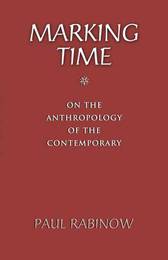
|
Marking Time: On the Anthropology of the Contemporary
Paperback / softback
Main Details
| Title |
Marking Time: On the Anthropology of the Contemporary
|
| Authors and Contributors |
By (author) Paul Rabinow
|
| Physical Properties |
| Format:Paperback / softback | | Pages:168 | | Dimensions(mm): Height 216,Width 140 |
|
| Category/Genre | Philosophy |
|---|
| ISBN/Barcode |
9780691133638
|
| Classifications | Dewey:301.01 |
|---|
| Audience | | Professional & Vocational | | Tertiary Education (US: College) | |
|---|
|
Publishing Details |
| Publisher |
Princeton University Press
|
| Imprint |
Princeton University Press
|
| Publication Date |
18 November 2007 |
| Publication Country |
United States
|
Description
In Marking Time, Paul Rabinow presents his most recent reflections on the anthropology of the contemporary. Drawing richly on the work of Michel Foucault, John Dewey, Niklas Luhmann, and, most interestingly, German painter Gerhard Richter, Rabinow offers a set of conceptual tools for scholars examining cutting-edge practices in the life sciences, security, new media and art practices, and other emergent phenomena. Taking up topics that include bioethics, anger and competition among molecular biologists, the lessons of the Drosophila genome, the nature of ethnographic observation in radically new settings, and the moral landscape shared by scientists and anthropologists, Rabinow shows how anthropology remains relevant to contemporary debates. By turning abstract philosophical problems into real-world explorations and offering original insights, Marking Time is a landmark contribution to the continuing re-invention of anthropology and the human sciences.
Author Biography
Paul Rabinow is professor of anthropology at the University of California, Berkeley, and the author, most recently, of "A Machine to Make a Future: Biotech Chronicles" (Princeton).
Reviews"This essay is an intellectual pause in an active scholarly career... Rabinow contemplates the automation of science and art, where art becomes nature and nature art."--C.S. Peebles, Choice "[T]his book deserves a readership beyond anthropologists and scholars in science and technology studies. Read more generously, Rabinow's conversations with historians and philosophers (both ancient and modern), critics of art and literature, and artists and scientists could shed light on the problems of designing inquiry into the ethos and logos of any time."--Natasha Myers, Isis
|